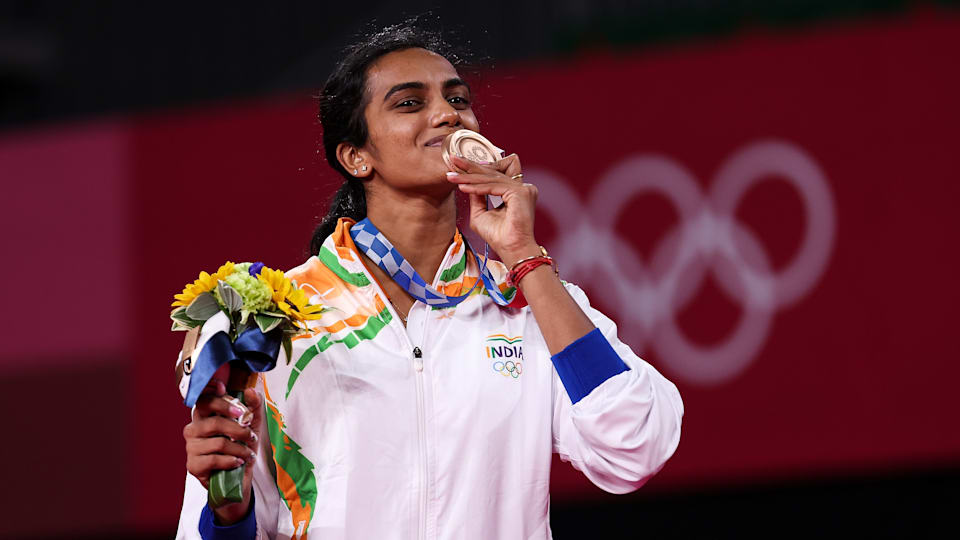PV Sindhu reshapes history at Tokyo 2020
PV Sindhu became the first Indian woman to claim two Olympic medals after she won a badminton bronze medal in Tokyo, adding to her silver from Rio 2016.

Indian badminton ace PV Sindhu left Tokyo 2020 having carved out a slice of history for her own.
After clinching the bronze medal in the women’s singles badminton competition, Sindhu is now the first woman from her country ever to become a double Olympic medallist.
Off the back of her historic silver in Rio 2016, there was an unrelenting buzz around the 26-year-old and what she might achieve in her next Olympic Games in Tokyo.
When she transformed herself from ‘Silver Sindhu’ to badminton World Champion in 2019, it was clear that the shuttler was entering altogether a different kind of level in her sport; no longer was she willing to settle for second best in finals.
Although Sindhu was ultimately outclassed by Tai Tzu-Ying of Chinese Taipei en route to the gold medal match such was the Indian’s resilience, and grit, that she was able to brush off her golden disappointment and manifest a winner’s energy to once again come home with a prize.
PV Sindhu's road to Tokyo 2020 Olympic medal
PV Sindhu’s tournament, bar her stutter in the semi-final, was nothing short of dominant.
The shuttler cruised through the competition’s early group play stage, dispensing quickly with Ksenia Polikarpova of Israel 2-0 (21-7, 21-10) and then Cheung Ngan Yi in similar fashion, 2-0 (21-9, 21-16).
41 minutes was all time it took for Sindhu to fly through to the quarterfinals. Denmark’s Mia Blichfeldt fell at the Indian’s hands 2-0 (21-15, 21-13). Akane Yamaguchi**,** the number four seed, suffered a similar fate thereafter. Sindhu powered through 2-0, once again without dropping a set.
The semi-final, however, was a slightly different story for the shuttler.
Sindhu’s opponent, Tai Tzu-Ying used all her guile and wit to effectively neutralise the Indian’s greatest weapons in the fight for a place in the gold medal match.
The shuttler from Chinese Taipei targeted Sindhu’s body, challenging the shuttler to match her own formidable footwork. Sindhu however, was not able to respond as she would have liked, struggling for pace on her returns.
Sindhu hustled hard in the first as the pair moved from 11-11 to 18-18 before her rival found the next gear and clinched the set.
Rattled, Sindhu was unable to find the lines with her usually lethal cross-court smashes and all but played herself out of the second set.
The door to gold had been firmly shut, the only route left open: a shot at bronze.
Fighting for history
It would have been all too easy for Sindhu to wallow in her golden woes.
In fact, the mental challenge going into her bronze medal clash was the hardest aspect of her bronze medal victory.
“Constantly I was thinking about the bronze medal match later in the day," Sindhu was quoted saying by Firstpost. "Kept thinking ‘What’s going to happen?’ I had a lot of things inside me going: ‘what if you win?’, ‘what if you lose?’, ‘what if you win?’, ‘what if you lose?’"
Taming the inner turmoil wreaking havoc on her mind required focus and serenity.
Both assets were something that the Indian fortunately managed to locate in time for her clash with He Bing Jiao, and just as well, the 24-year-old shuttler went into the medal match with a positive head-to-head against Sindhu.
The opening rally of the match exemplified the kind of battle Sindhu was in for; it lasted 22 strokes.
Deploying her strength advantage, and her usual on-court aggressiveness, the Indian quickly ran away with the first set: 21-13.
The second was a much tighter affair: things were all level at 11-11.
It required digging into the reserves, but Sindhu was all too prepared and, leaving her opponent rooted for one last time, Sindhu sealed the bronze by stepping forward and sending just close to the forehand line.
Master of her own destiny at Tokyo 2020
When Sindhu touched down in Delhi’s Indira Gandhi International Airport with her bronze medal in her grasp, she received a hero’s welcome.
Drummers played as fans greeted the star who was smiling from ear-to-ear at the reception put before her.
With several of India’s athletes excelling at Tokyo 2020, Sindhu’s own story from Japan will be one narrative of many shared, told and dissected as the Games are digested.
But certain to always set her apart will be the way in which she has answered the medal call not once but twice, and that maybe still, the best is yet to come.
